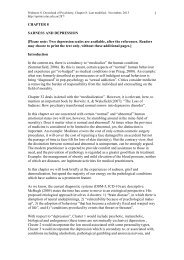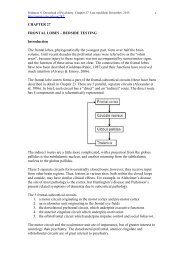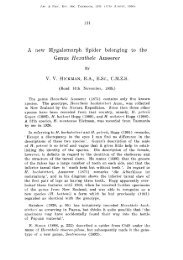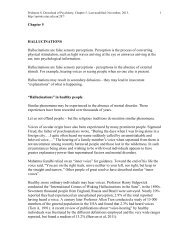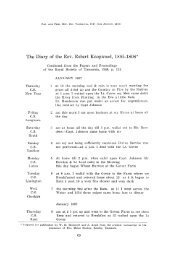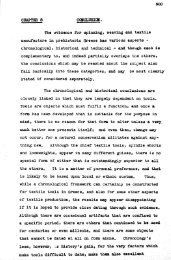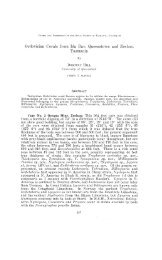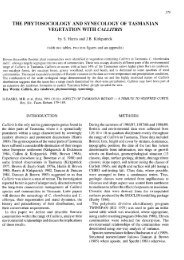PDF (Chapter 4: Delusions and Delusional Disorder) - UTas ePrints
PDF (Chapter 4: Delusions and Delusional Disorder) - UTas ePrints
PDF (Chapter 4: Delusions and Delusional Disorder) - UTas ePrints
Create successful ePaper yourself
Turn your PDF publications into a flip-book with our unique Google optimized e-Paper software.
Pridmore S. Download of Psychiatry, <strong>Chapter</strong> 4. Last modified: November, 2013<br />
http://eprints.utas.edu.au/287/<br />
15<br />
John lacked insight, which means that he was unaware that what he believed was<br />
incorrect, unaware that he was suffering a mental disorder <strong>and</strong> unaware that he needed<br />
psychiatric treatment. By definition, if you come to accept that your belief is incorrect,<br />
you can no longer fully believe it, <strong>and</strong> you can no longer have a delusion. That is how it<br />
works in theory. In practice, interestingly, people can have partial insight, which means<br />
they may be able to see that their delusion is incorrect in fact, but continue to behave as<br />
though it is at least partly correct.<br />
John’s lack of insight made it illogical for him to accept that he needed medical help. He<br />
went to the Government Medical Officer because he wanted to keep his job in the<br />
Commonwealth Government. He therefore had no alternative but to comply with that<br />
instruction. The same thing applied to the Government Medical Officer’s<br />
recommendation that he see a psychiatrist. John finally agreed to see a psychiatrist “to<br />
prove” that he was well <strong>and</strong> that his account of events was accurate. While giving such<br />
reasons, patients sometimes also have a small degree of insight, some tiny doubts about<br />
the accuracy of their thinking, <strong>and</strong> may agree to see psychiatrists to reassure themselves<br />
that they have got things right.<br />
The psychiatrist did not get into whether or not she believed John’s story. She believed he<br />
believed it. She got him to bring his wife along. The three of them talked about “the<br />
problems” John was having at work.<br />
“Well, Mr. Miller, as you know, this is pretty much the first time Mrs Miller <strong>and</strong> I have<br />
heard about these issues. I’m sure you will underst<strong>and</strong> if we ask you to explain how some<br />
of these things started to happen?”<br />
Helen was distressed to hear the full extent of her husb<strong>and</strong>’s beliefs, but she was<br />
reassured by the psychiatrist’s composure <strong>and</strong> supportive approach. By this stage the<br />
general practitioner had a better underst<strong>and</strong>ing <strong>and</strong> his name could be used. Toward the<br />
end of the interview, the psychiatrist said,<br />
“All of us want the best for you. Worrying about all these things must be very distressing.<br />
I speak for myself <strong>and</strong> your general practitioner, Dr Chen, <strong>and</strong> I’m sure, for Mrs Miller as<br />
well. We all believe you should probably take some medicine which will help you deal<br />
with the stress you are currently under…How about that? Do you think some medicine<br />
might ease some of your distress <strong>and</strong> help you deal with things?”<br />
The suffering which is secondary to delusions takes many forms. Fear or anxiety <strong>and</strong><br />
insomnia are common <strong>and</strong> are a natural consequence of the belief that one is in dangerous<br />
circumstances. Some individuals waste money on items such as additional locks <strong>and</strong><br />
security devices, new televisions sets <strong>and</strong> telephones, <strong>and</strong> sometimes a range of<br />
unnecessary medical or scientific tests to check for levels of poisons in their blood or<br />
water tanks, <strong>and</strong> other hard evidence. <strong>Delusions</strong> frequently lead to conflict at home <strong>and</strong><br />
work (divorce <strong>and</strong> dismissal) irrespective of whether others are aware of the illness or<br />
not.







